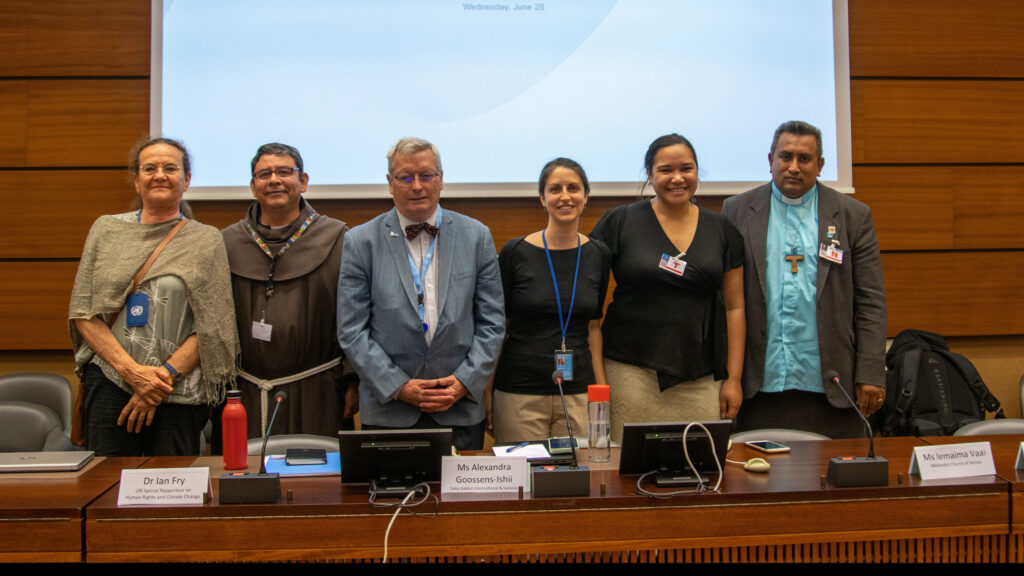As the effects of climate change have become increasingly felt in recent years, there has already been a steep rise in the number of displaced people as a consequence. Extreme weather events such as floods and hurricanes are becoming more frequent. At the same time, we also see slow-onset hazards, like desertification and sea level rise. This has already led to water scarcity, loss of agriculture and livelihoods, and the destruction of people’s homes, pushing them to relocate either internally or outside of their country’s borders.
During his recent Interactive Dialogue with the UN Human Rights Council, Special Rapporteur on climate change Ian Fry presented his report on the human rights implications of climate-induced displacement. This is the first issue covered by the new mandate since its creation in May 2022, showing the urgency of this issue. In his report, Mr. Fry highlighted the lack of legal protection for persons displaced by climate change across international borders. For example, they are not defined as refugees under the 1951 UN Refugee Convention. While they are often informally called climate refugees, there is actually no such definition under international law, which exacerbates the risk of human rights violations against this group.
Franciscans International and partners organized two side events on climate displacement as well as one on the regularization of migrants, inviting speakers from the Americas and Asia-Pacific to share their experiences and stories with UN human rights experts and diplomats. They called attention to the disproportionate impact of climate change events on vulnerable groups such as women, children, and Indigenous Peoples. Research indicates that climate-induced displacement is not a gender-neutral phenomenon, with women being 14 times more likely to get killed if they are displaced than men. They are also more vulnerable to sexual violence, trafficking, and the lack of access to reproductive health.
Brother René Flores OFM, a member of the Franciscans Network for Migrants in Panama, explained the many ways in which people are impacted by climate change events, especially in Central America’s Dry Corridor*. While years of drought have led to water scarcity and food insecurity, hurricanes have also become more severe. In 2020, Eta and Iota caused floods and destruction across Central America, affecting millions of people. These events, combined with extreme poverty and violence, have driven substantial cross-border migration.
While the loss of resources linked to human mobility is important, non-economic losses can also be devastating. Ms. Lemaima Vaai, a young Indigenous woman from the Methodist Church in Samoa, raised the issue of the emotional and spiritual pain of relocation. For communities in the Pacific, there is a deep attachment to the land that often brings “feelings of loss and disconnect” when having to move, as well as the risk of Indigenous knowledge being lost.
Rev. James Bhagwan, General Secretary of the Pacific Conference of Churches, also warned that “Pacific leaders have already identified climate change as the single most important threat for regional security”. Indeed, it can become a driver of conflict over land and resources, especially with the sea-level rise threatening the very existence of some nations. As there would be no place to return to for these populations, this would trigger permanent displacements as well as profound questions about statehood and sovereignty.
This is the case of the Republic of Kiribati, a group of 33 Pacific Islands of around 100.000 inhabitants, and one of the small islands developing states that is the most at risk of being engulfed. FI raised this case using the Universal Periodic Reviews of the country in 2014 and 2020 to push the international community to both recognize and address this issue.
As the consequences of climate change are becoming more severe, it is necessary to address the current protection gaps and to have legal instruments and policies that reflect the ongoing situation. To achieve this, it is essential that decision-makers at the UN hear from those that are most directly impacted to understand the reality on the ground.
FI joins the Special Rapporteur’s call for urgent action, especially considering the consequences of climate-induced displacement will only get worse every day we do not act. Together with our partners and Franciscan brothers and sisters at the grassroots, we will keep advocating for a human rights-based approach around climate displacement that ensures the respect of each person’s dignity.
• • •
For more information about Franciscan work on human mobility, check out our publication: “Tearing Down the Walls” and our interventions at the United Nations.
* “The Dry Corridor includes parts of Costa Rica, El Salvador, Guatemala, Honduras and Nicaragua. It is characterized by long periods of drought alternating with periods of heavy rainfall that seriously affect the livelihoods and food security of its 10 million residents.”

